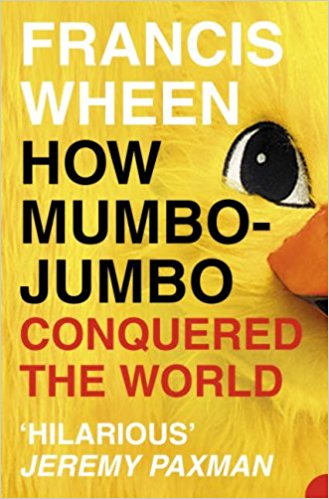Rationalising imperialism
 Francis Wheen, How Mumbo-Jumbo Conquered the World: A Short History of Modern Delusions, Harper, 2004. Paperback, 338pp, £8.99.
Francis Wheen, How Mumbo-Jumbo Conquered the World: A Short History of Modern Delusions, Harper, 2004. Paperback, 338pp, £8.99.
THE TITLE of this book is not encouraging, with its thoughtless reference to an eighteenth-century Mandingo deity. Why should it be an aspect of West African religion that has become a byword for nonsense rather than, say, one of the many absurdities of Christianity? Er … perhaps because the colonisers of Africa were themselves Christians who justified their oppression and exploitation of its inhabitants by depicting them as ignorant, superstitious savages who had to be “civilised” by European conquest?
At least we are given fair warning that an anti-imperialist sensibility is not to be expected from the author. And so it proves.
The book’s theme is contained in its subtitle, “A Short History of Modern Delusions” (it was originally going to be “A Brief History of Bollocks”, but the publishers demurred). The text comprises a series of often sarcastic attacks on various of the author’s ideological bêtes noires – monetarism, New Age gurus, postmodernism, New Labour, creationism, militant Islamists – rather pompously dressed up as a defence of the Enlightenment.
At times it makes for entertaining reading. Who can object to Deepak Chopra or Tony Blair getting a slagging off? But Wheen treats the ideas he criticises primarily as stupid or malevolent thoughts in people’s heads, without any serious examination of their material foundations and social origins.
Contrary to Wheen’s critique, the free market theories adopted by Thatcher and Reagan were not just a product of wrong thinking – they provided the bourgeoisie with a necessary justification for the attacks it launched on organised labour and the welfare state following the end of the post-war boom. If postmodernist scepticism towards “grand narratives” has gained some purchase, it is not least because the forces who are the main agents of historical progress were severely weakened by the partial success of those bourgeois attacks. If forms of political Islamism have acquired mass support, this has some relationship to the fact that, whereas secular and leftist forces in the “Third World” were often defeated and discredited, the Iranian revolution and the Afghan mujahideen provided examples of political victories inspired by religious belief.
Predictably, in the closing section of the book Wheen lurches into an Islamophobic rant of the sort that has become fashionable among broad sections of the liberal intelligentsia. Rather as the colonialists regarded worshippers of the original Mumbo Jumbo, Wheen depicts Islamist militants as no more than primitive savages who lack his own superior western understanding of the world. So Seumas Milne’s suggestion that the 9/11 atrocities might have been inspired by certain genuine grievances against US imperialism is contemptuously dismissed as an apologia for mindless barbarism. Quotations from right-wing commentators are wheeled out to condemn those like Michael Moore who question the modernising mission of the West.
Admittedly, your reviewer has an axe to grind here, in that he is one of the more minor figures Wheen polemicises against. Regarding Afghanistan under the Taliban, Wheen writes: “Valiant feminists who protested against the compulsory wearing of the burka or the abolition of girls’ schools were accused of ‘racist arrogance’. How dare they, living in the West, presume to pass judgment on poorer and weaker nations?” The reference is to an article by yours truly in the Weekly Worker.
Quite why it should require any particular valour on the part of western feminists to condemn the Taliban is not explained. Was Mullah Omar going to send out a hit squad to assassinate them? As for myself, in the article Wheen quotes I made no mention of feminists at all and was in fact criticising certain self-styled Marxists who during the murderous onslaught by US imperialism on Afghanistan argued for neutrality on the grounds that the victims were reactionary Muslim fundamentalists who were no better than those who had invaded their country.
So much for the “Enlightenment values” Wheen claims to hold so dear. When it comes to diatribes against his opponents on the left, intellectual honesty and even an elementary capacity for coherent thought desert him. Personally, I would propose an alternative subtitle for the book: “A Short Illustration of the Limitations of Bourgeois Rationalism.”
Published in What Next? in 2004